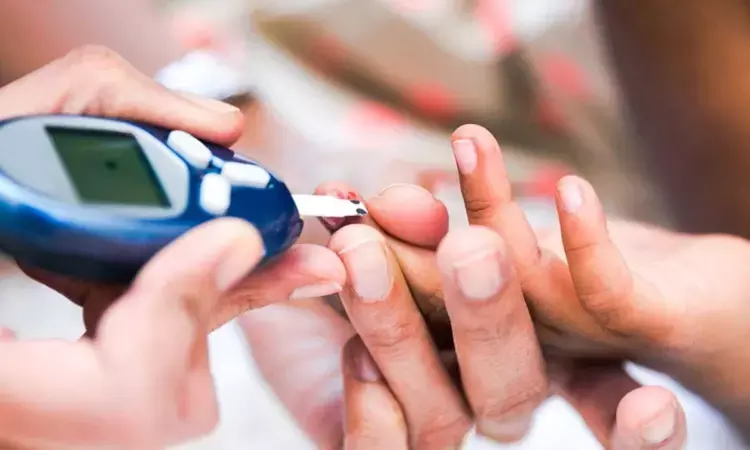- Home
- Medical news & Guidelines
- Anesthesiology
- Cardiology and CTVS
- Critical Care
- Dentistry
- Dermatology
- Diabetes and Endocrinology
- ENT
- Gastroenterology
- Medicine
- Nephrology
- Neurology
- Obstretics-Gynaecology
- Oncology
- Ophthalmology
- Orthopaedics
- Pediatrics-Neonatology
- Psychiatry
- Pulmonology
- Radiology
- Surgery
- Urology
- Laboratory Medicine
- Diet
- Nursing
- Paramedical
- Physiotherapy
- Health news
- Fact Check
- Bone Health Fact Check
- Brain Health Fact Check
- Cancer Related Fact Check
- Child Care Fact Check
- Dental and oral health fact check
- Diabetes and metabolic health fact check
- Diet and Nutrition Fact Check
- Eye and ENT Care Fact Check
- Fitness fact check
- Gut health fact check
- Heart health fact check
- Kidney health fact check
- Medical education fact check
- Men's health fact check
- Respiratory fact check
- Skin and hair care fact check
- Vaccine and Immunization fact check
- Women's health fact check
- AYUSH
- State News
- Andaman and Nicobar Islands
- Andhra Pradesh
- Arunachal Pradesh
- Assam
- Bihar
- Chandigarh
- Chattisgarh
- Dadra and Nagar Haveli
- Daman and Diu
- Delhi
- Goa
- Gujarat
- Haryana
- Himachal Pradesh
- Jammu & Kashmir
- Jharkhand
- Karnataka
- Kerala
- Ladakh
- Lakshadweep
- Madhya Pradesh
- Maharashtra
- Manipur
- Meghalaya
- Mizoram
- Nagaland
- Odisha
- Puducherry
- Punjab
- Rajasthan
- Sikkim
- Tamil Nadu
- Telangana
- Tripura
- Uttar Pradesh
- Uttrakhand
- West Bengal
- Medical Education
- Industry
Thiamine supplementation can prevent vascular complications in patients with diabetes

Pakistan: Researchers in a recent study published in Cureus recommend routine monitoring of serum thiamine levels in diabetic patients and suggest considering thiamine supplementation to avoid complications, especially vascular complications of diabetes mellitus (DM).
The study revealed that patients with type 1 and type 2 diabetes had significantly higher levels of fasting blood sugar (FBS), random blood sugar (RBS), triglycerides, glycated haemoglobin (HbA1c), and total cholesterol than control. Furthermore, serum thiamine and HDL levels were observed to be considerably lower in both type 1 and type 2 DM patients than those of controls. Also, there was a strong correlation between FBS and HbA1c among both types of diabetes mellitus and controls.
Thiamine, also known as vitamin B1, is a water-soluble vitamin that plays a critical role in the metabolism of both vital amino acids and carbohydrates. It has antioxidant and anti-inflammatory characteristics that affect endothelial function.
Previous studies have shown that low levels of thiamine reserves in the body are related to diabetes because thiamine directly impacts carbohydrate metabolism. Therefore, Atif A. Hashmi, Liaquat National Hospital and Medical College, Karachi, PAK, and colleagues aimed to assess several metabolic variables and blood thiamine levels in patients with type 1 and type 2 DM and compare them with those in a control group of healthy individuals in a case-control study conducted at multiple diabetic outpatient centres in Karachi.
The study included 90 participants; they were divided into three groups, each comprising 30 individuals. Group A served as the control group and comprised of healthy, non-diabetic individuals. Groups B and C contained subjects with type 1 and type 2 diabetes, respectively.
Descriptive analysis was reported as the mean standard deviation, comorbidities and gender were expressed as percentages and frequencies. Pearson’s correlation coefficient and chi-square test were used to determine the associations of the variables with type 1 DM, type 2 DM, and controls.
The study revealed the following findings:
· There were statistically significant differences between controls, type 1 and type 2 DM, in the means of blood glucose levels and all lipid profiles, such as glycated haemoglobin, random blood sugar, fasting blood sugar, triglycerides, serum thiamine, high-density lipoprotein (HDL), and total cholesterol.
· Among the control group, type 1 and type 2 diabetes, HbA1c, and FBS were insignificantly correlated with thiamine levels, whereas the HbA1c and FBS of the combined diabetic groups were significantly correlated with the thiamine level (r = 0.465) and (r = 0.360), respectively, where 'r' is the Pearson correlation coefficient.
· HbA1c and FBS in the combined three groups were significantly correlated with the thiamine level (r = −0.626) and (r = −0.561), respectively.
"Based on the findings, we recommend routine monitoring of thiamine levels in diabetic patients, and early thiamine supplementation should be considered, particularly if there are signs of vascular complications on clinical examination," the researchers concluded.
Reference:
Khan M, Mubeen M, Chohan H, et al. (September 29, 2023) Correlation of Fasting Blood Sugar and Glycated Hemoglobin (HbA1c) With Thiamine Levels in Diabetic Patients. Cureus 15(9): e46178. doi:10.7759/cureus.46178
Dr Kamal Kant Kohli-MBBS, DTCD- a chest specialist with more than 30 years of practice and a flair for writing clinical articles, Dr Kamal Kant Kohli joined Medical Dialogues as a Chief Editor of Medical News. Besides writing articles, as an editor, he proofreads and verifies all the medical content published on Medical Dialogues including those coming from journals, studies,medical conferences,guidelines etc. Email: drkohli@medicaldialogues.in. Contact no. 011-43720751


